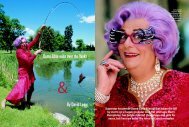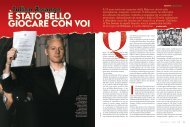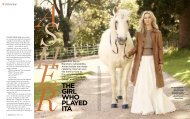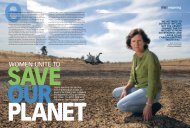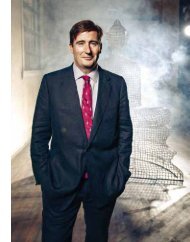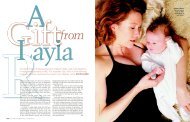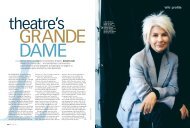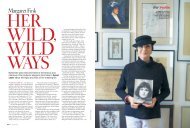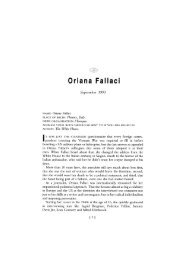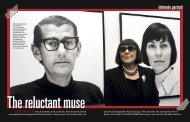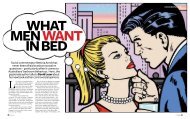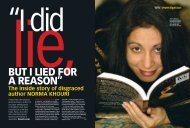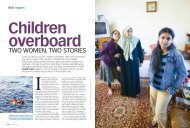WW | intimate portrait - David Leser
WW | intimate portrait - David Leser
WW | intimate portrait - David Leser
You also want an ePaper? Increase the reach of your titles
YUMPU automatically turns print PDFs into web optimized ePapers that Google loves.
<strong>WW</strong> | <strong>intimate</strong> <strong>portrait</strong><br />
Susan Sarandon,<br />
stunning at nearly<br />
60, uses her<br />
celebrity status to<br />
champion social and<br />
political causes.<br />
desperately<br />
seeking<br />
Susan<br />
Would you fly 31,000<br />
kilometres to spend an<br />
hour with someone?<br />
<strong>David</strong> <strong>Leser</strong> would, but<br />
only if that someone<br />
was the fascinating<br />
Susan Sarandon.<br />
LET’S FACE IT, there aren’t many people<br />
in the world you’d fly 15,572 kilometres to<br />
see just for an hour. Take in the return<br />
journey and it’s actually more like 31,000<br />
kilometres for the dubious honour of<br />
spending 60 minutes in that person’s<br />
company. That’s about 520 kilometres for<br />
every precious minute you’re with them.<br />
He or she would have to be a special<br />
somebody, right? Maybe Mother Teresa<br />
or John Lennon, were either still alive.<br />
Somebody endowed with qualities you<br />
don’t normally find – a combination,<br />
perhaps, of shining intelligence and earthy<br />
wisdom, deep humanity and a fierce social<br />
and political conscience; somebody smart<br />
and wise and empathic, and, well, yes, in<br />
this case, bosomy and beautiful, too, in an<br />
ageless sex-goddess kind of way.<br />
Remember the time she squeezed lemon<br />
juice on her breasts in Atlantic City, playing<br />
opposite Burt Lancaster? Remember her<br />
as the shameless hussy to both Tim Robbins<br />
and Kevin Costner in the baseball classic<br />
Bull Durham? “There’s never been a<br />
ballplayer who slept with me that didn’t<br />
have the best year of his career.”<br />
Sorry … it’s easy to get carried away<br />
here, but, let’s be honest, she’s portrayed<br />
some alluring and, at times, ill-behaved<br />
women during an illustrious 36-year<br />
career: Catherine Deneuve’s lesbian lover<br />
in The Hunger, Brooke Shields’ prostitute<br />
mother in Pretty Baby, James Spader’s<br />
smouldering paramour in White Palace,<br />
and, of course, fugitive ballbreaker that<br />
she was, Louise Sawyer, in the feminist<br />
road movie, Thelma & Louise. (And that’s<br />
not counting, more recently, Jude Law’s<br />
older temptress in Alfie, or the groupie<br />
gone straight, Lavinia Kingsley, in The<br />
Banger Sisters.)<br />
So, yes, it’s true these roles might help<br />
determine whether a middle-aged man<br />
such as myself would want to consider<br />
travelling across the world to spend an<br />
hour with someone like that. Yet would<br />
it be enough to get me across the line?<br />
Probably not (liar, liar, pants on fire).<br />
Surely you’d need something else, such as<br />
her Academy Award-winning performance<br />
as the New Orleans nun, Sister Helen<br />
Prejean, in Dead Man Walking, or her<br />
unforgettable portrayal as that lioness of<br />
a mother in Lorenzo’s Oil (for which she<br />
received one of her four Oscar nominations)<br />
to get a man to take out his suitcase.<br />
Yet even then you’d be ill-advised<br />
not to throw into the mix the real-life<br />
attributes we’ve read so much about – her<br />
devotion to her children, whom she began<br />
having when she was nearly 40; the love<br />
of a partner (actor/writer/director Tim<br />
Robbins) 12 years her junior; and the<br />
championing of various political and<br />
social causes – women’s rights, an end to<br />
the death penalty, the saving of rainforests,<br />
the plight of Africa – and, more recently,<br />
her fierce opposition to the war in Iraq, for<br />
which she has been vilified and threatened.<br />
Add to that her status as “Hollywood’s<br />
sexiest older woman”, the screen icon<br />
who had a belly-dancing party when she<br />
turned 58 and now, at nearly 60, still turns<br />
younger men’s heads and, yes, I think it’s<br />
safe to say the suitcase is packed and the<br />
ticket is bought.<br />
The only question now is a strategic<br />
one: how long will it take me to get to the<br />
airport without appearing over-zealous?<br />
IT’S FUNNY HOW OFTEN you read<br />
articles about Susan Sarandon arriving for<br />
an interview dressed casually in jeans ���<br />
2 | <strong>WW</strong> JULY 2006 <strong>WW</strong> JULY 2006 | 3<br />
PHOTOGRAPHY BY FABRIZIO FERRI.
and sneakers, titian hair tied back,<br />
sunglasses perched on her crown, no<br />
make-up or hint of surgical enhancement<br />
in sight. Perhaps that’s because it’s true.<br />
Susan Sarandon arrives for this interview<br />
dressed like the description above, drop<br />
pearl earrings adding to her appearance<br />
of chic insouciance, a red-striped shirt<br />
unbuttoned fetchingly at the top, a look of<br />
no nonsense in those remarkable almond<br />
eyes and a firm handshake at the ready.<br />
<strong>WW</strong>E MEET AT her favourite Greenwich<br />
S<br />
Village bistro, where she has just finished<br />
lunching with her daughter, Eva Amurri,<br />
the 21-year-old multilingual actress from<br />
Susan’s relationship with Italian director<br />
Franco Amurri in the mid-’80s. (Eva has<br />
appeared with her mother in two films, The<br />
Banger Sisters and Anywhere But Here.)<br />
Susan sits down, unbuttons her jacket<br />
and, with very little prompting, begins to<br />
regale me with how a journalist recently<br />
took creative licence with her quotes, so<br />
much so that she was totally confused by<br />
what she’d supposedly said. “You can<br />
only be as smart as the person interviewing<br />
you,” she offers with a smile that suddenly<br />
looks like a warning. “So if they already<br />
have an angle before they go to meet with<br />
you, then they’re not listening – just as<br />
some actors do when they’re in a scene<br />
and they come already deciding what’s<br />
going to happen between you.<br />
“It’s a little bit like public officials picking<br />
and choosing their information before they<br />
start a war. They just listen to that information<br />
that supports their invasion, as opposed to<br />
listening to information that might question<br />
whether or not they should go in.”<br />
And there it is at the outset. The actor<br />
and the activist. Susan Sarandon brandishing<br />
her fist at perceived injustice the way<br />
she’s been doing since the civil rights and<br />
anti-Vietnam protests of the 1960s and<br />
’70s. In the mid-1980s, as her film career<br />
was beginning to flourish, she was also being<br />
put under surveillance for her opposition<br />
to the Reagan Administration’s covert war<br />
against Nicaragua. In 1993, she caused an<br />
outcry at the Oscars when she and partner<br />
Tim Robbins decided to use their 37 seconds<br />
on the podium to talk about the plight<br />
of AIDS-afflicted Haitians interned in<br />
Guantanamo Bay (this was a decade before<br />
anybody had heard of Guantanamo Bay!).<br />
In 1999, she was arrested for “disorderly<br />
conduct” for protesting against the shooting<br />
of an unarmed African immigrant by four<br />
New York policemen. And from the time<br />
of the first Gulf War in the early 1990s,<br />
she has been railing against what she sees<br />
as her government’s hypocrisy and deceit.<br />
“Somehow it became anti-American to<br />
ever discuss anything,” she says, clearly<br />
infuriated by the turn her country has taken.<br />
Three years ago, with the American-led<br />
invasion of Iraq, the tone of things turned<br />
decidedly nasty. Radio hate jocks began<br />
baying for her blood over her public<br />
denunciations of the Bush Administration.<br />
Film studios were asked not to hire her –<br />
not that that had much effect – and even<br />
the Baseball Hall of Fame, in theory a<br />
non-political organisation, cancelled<br />
her and Tim Robbins’ appearance at the<br />
15th anniversary of Bull Durham.<br />
“And there have been all these other<br />
little things, too,” she says now, sipping a<br />
glass of water. “My niece in Virginia was<br />
doing a production of The Wizard of Oz<br />
and the drama teacher said to my sister,<br />
‘I hope your sister isn’t planning to come<br />
because we won’t let her’. My nephew in<br />
New Jersey was at a class and his teacher<br />
said, ‘I’d like to smash her teeth in’.”<br />
Just recently on Christopher Street, in<br />
the heart of Greenwich Village, the star of<br />
more than 35 feature films was abused as<br />
she was leaving a restaurant. “I was with<br />
my younger son and his friend … and a<br />
carload of young guys was going by and<br />
they said, ‘Hey, Susan’. I always look up<br />
with a smile and they said, ‘You’re a terrible<br />
American. You should die’.”<br />
“I’VE THOUGHT WE WOULD HAVE TO LIVE ELSEWHERE.<br />
THERE WERE DEATH THREATS [AND PHONE TAPS] AND<br />
SUGGESTIONS THAT PEOPLE DO SOMETHING TO ME.<br />
AND THEY STARTED PRINTING MEAN STORIES ABOUT<br />
MY KIDS IN THE PAPER THAT WEREN’T TRUE.”<br />
Then, in that same period, a friend was<br />
arrested in the Hamptons for wearing a<br />
sign with the number of dead American<br />
soldiers on it. “This was the Hamptons,”<br />
Susan exclaims, referring to upstate New<br />
York’s playground for the rich. “But that’s<br />
the environment of fear [that’s operating]<br />
and people don’t know what to do. They<br />
see celebrities being silenced and they<br />
think, ‘God, that can happen to them?’<br />
“And I’m not that far left,” she continues.<br />
“I’m really in the middle. It’s just the way<br />
that they would have me presented – that<br />
I’m a leftie. But, in fact, the values I stand<br />
for – unions, education and healthcare …<br />
most Americans stand for.”<br />
With all these dark reminders of<br />
McCarthyism returning to haunt her<br />
country, Susan Sarandon admits she has<br />
thought of leaving, as did so many actors<br />
and directors in the early 1950s. “I’ve<br />
thought we would have to live elsewhere,”<br />
she says. “There were death threats [and<br />
phone taps] and suggestions that people<br />
do something to me. And they started<br />
printing mean stories about my kids in the<br />
paper that weren’t true. And things like<br />
that made my children very anxious and<br />
I did think we might have to leave.”<br />
And, yes, New Zealand loomed large<br />
in her thinking. “I love New Zealand and<br />
I think they’re probably the closest [to my<br />
way of thinking] in terms of a government<br />
trying to give people a fair shake. At least<br />
it seems like a government that has a dialogue<br />
going … But I really don’t want to leave.<br />
I love this country. And my children love<br />
this country and they love this city. We’ve<br />
lived through the 11th [the terrorist attacks<br />
on the US on September 11, 2001] and it<br />
made them and myself even more committed<br />
to being New Yorkers.<br />
“Also … as a privileged person, I hate the<br />
idea of just picking up and leaving. I kind of<br />
feel as if I’m going to stay here until they<br />
throw me out. I want to make it clear that if<br />
I were to leave, I want to make it public and<br />
make people understand why I was leaving –<br />
that I was given no alternative.”<br />
SUSAN WAS BORN in New York but<br />
raised on the wrong side of the tracks in<br />
New Jersey, which probably helps explain<br />
why she plays working-class women<br />
so well (Atlantic City, White Palace,<br />
Thelma & Louise).<br />
The oldest of nine children, her father<br />
was a big-band singer with Celtic roots<br />
and her mother an emotionally damaged<br />
woman of Sicilian ancestry. Her mother,<br />
Lenora Tomalin, now in her 80s and living<br />
in Virginia, was born to a 13-year-old<br />
mother and abandoned when she was two,<br />
brought up first in foster care and then in a<br />
Catholic boarding school.<br />
Susan’s grandmother had links to<br />
the Mafia, but was not entirely beyond<br />
redemption. “She came back into [my<br />
mother’s] life when she was 17,” Susan<br />
says now, “but the nuns wouldn’t let her visit.<br />
She didn’t look like a mum, whatever that<br />
meant. And then, later on, we realised she<br />
was running numbers [illegal lotteries run<br />
by organised crime] at one point. She ran<br />
a jazz club somewhere in the mid-town<br />
and went to the [horseracing] track. I have<br />
no idea what happened to her.”<br />
In 1967, at the age of 20, Susan Tomalin<br />
married the first man she slept with, acting<br />
student Chris Sarandon. Three years later,<br />
both arrived for an audition in New York<br />
for a film called Joe. Susan, who had no<br />
burning ambition to become an actor, got<br />
the nod ahead of her husband.<br />
By 1975, she was on her way to cult<br />
status by having played the luckless<br />
Janet in The Rocky Horror Picture ���<br />
PHOTOGRAPHY BY FABRIZIO FERRI.<br />
It’s easy to see why<br />
Susan has portrayed<br />
some alluring women<br />
in her movie career.<br />
BEAUTY NOTE<br />
Susan wears Revlon Age<br />
Defying Makeup with<br />
Botafi rm for Dry Skin in<br />
Medium Beige, ColorStay<br />
Eyeshadow Quad in Berry<br />
Bloom, Luxurious Lengths<br />
Mascara in Blackest Black,<br />
Super Lustrous Lipstick<br />
in Soft Suede and<br />
Super Lustrous Lip<br />
Gloss in Nude Lustre.<br />
4 | <strong>WW</strong> JULY 2006 <strong>WW</strong> JULY 2006 | 5
Show (she lost her virginity to a transvestite!).<br />
Three years later, she appeared in French<br />
director Louis Malle’s debut American<br />
movie, Pretty Baby, becoming his lover<br />
during filming and then moving to France<br />
with him for nearly three years.<br />
By 1980, she’d earned her first Oscar<br />
nomination for Atlantic City, playing a<br />
croupier in that famous lemon-squeezing<br />
scene. Playboy magazine dubbed hers<br />
“the nipples of the decade” and pursued<br />
her, unsuccessfully, to be a centrefold.<br />
“You’ve got to be careful,” she once said,<br />
“not to be upstaged by your breasts. I’m at<br />
least a [37] C, sometimes a D, depending on<br />
the bra, and I have gotten curvier as I’ve<br />
gotten older. Directors cast the men they want<br />
to be and the women they want to have.”<br />
Her lovers were all fascinating: Louis<br />
Malle, Richard Gere, Christopher Walken,<br />
<strong>David</strong> Bowie – but not Sean Penn, as I<br />
wrongly suggest. “Well, I didn’t have Sean<br />
Penn as a lover,” she says in her deep, silky<br />
Manhattan inflections. She pauses. “But it’s<br />
a nice rumour to start.” The timing just<br />
happens to be perfect, her laughter infectious.<br />
“But considering how old I am,” she<br />
continues, “and how long I’ve been in the<br />
business … I’ve had serial monogamy.<br />
These poor girls who are now in tabloids<br />
constantly, they can’t sow their wild seeds<br />
without getting in the paper. I feel bad for<br />
them. I got married really young, so I’ve<br />
always been more of a one-guy gal.<br />
“For me, the whole sexual thing is a pretty<br />
<strong>intimate</strong> act. I’m not that sportif about it.<br />
So then, really, considering my station,<br />
I haven’t been with hardly anybody. In<br />
fact, when I first went to California,<br />
“YOU’VE GOT TO BE CAREFUL NOT TO BE UPSTAGED<br />
BY YOUR BREASTS ... AND I HAVE GOTTEN CURVIER AS<br />
I’VE GOTTEN OLDER. DIRECTORS CAST THE MEN THEY<br />
WANT TO BE AND THE WOMEN THEY WANT TO HAVE.”<br />
somebody said, ‘Do you know why you’re<br />
so popular? Because you’re the only one in<br />
this town who hasn’t f****d all the Eagles’.”<br />
Except in The Banger Sisters, I suggest.<br />
“Except in The Banger Sisters [with Goldie<br />
Hawn],” she says, laughing and placing<br />
particular emphasis on the word “banger”.<br />
“And I had fun doing that.”<br />
Diagnosed with endometriosis earlier in<br />
her life, Susan was convinced she could never<br />
have children. Then, in 1984, she fell pregnant<br />
to Italian director Franco Amurri while<br />
working on a film about Mussolini. Like<br />
Tim Robbins, he, too, was 12 years younger<br />
than Susan, although the relationship didn’t<br />
last. In 1987, on the set of Bull Durham, she<br />
met Tim and, by the following year, they<br />
were seeing each other regularly. They have<br />
been together ever since and have two boys,<br />
Jack, 17, and Miles, 14.<br />
I ask her what it is about men 12 years<br />
younger and she replies, “It has to do with<br />
the person, not the age, really. I hadn’t met<br />
anyone Tim’s age before who was even<br />
aware of my politics and he was very<br />
political. He had this theatre company.<br />
He’d grown up in the [Greenwich] Village<br />
… And my daughter [who was two at the<br />
time] really liked him from the beginning.<br />
I don’t think I would have even thought<br />
about it if she hadn’t.”<br />
The best relationships, both on and off the<br />
screen, happen because of a convergence<br />
not easy to define. “What reads as sexual<br />
heat on screen is really about connection,”<br />
she says. “[And off screen] it’s the belief<br />
that a person sees you as nobody else sees<br />
you and something about the surrender to<br />
that incredibly courageous act of deciding<br />
to be <strong>intimate</strong> with another person.<br />
There’s a striking<br />
resemblance between<br />
Susan and Eva Amurri, 21<br />
(her daughter with Italian<br />
director Franco Amurri), seen<br />
here with their pet Maltese<br />
Pomeranian cross, Penny.<br />
“So, therefore, it can happen between<br />
people of any age. It can happen between<br />
people of any gender. It can happen<br />
between a small boy and an older woman.<br />
That’s what encourages people to be the<br />
protagonist in their own lives … these<br />
kinds of acts of courage.”<br />
And so, yes, while it’s “cool” to be<br />
considered the “thinking man’s sex symbol”,<br />
these balloons have a way of being punctured,<br />
particularly by one’s children. A few years<br />
ago, when the Lincoln Centre in New York<br />
hosted a gala tribute to Susan, they showed<br />
excerpts from several of her movies, some<br />
of which were steamy, if not erotic.<br />
“I mean, there were love scenes, but<br />
not nipples or what I would think of as<br />
being naked,” she says, laughing. “But I<br />
didn’t even have to be naked. Every time<br />
something would come on the screen, I<br />
would look over and my son [Jack], who<br />
was 12, would be going … [she screws up<br />
her face like a sick child] and when it was<br />
over, I asked my young guy [Miles], ‘Well,<br />
what did you think?’ And he said, ‘I thought<br />
it was cool, Mum, but scarring.’ And ���<br />
6 | <strong>WW</strong> JULY 2006 <strong>WW</strong> JULY 2006 | 7<br />
PHOTOGRAPHY BY FABRIZIO FERRI.
then I said to Jack, ‘Well, what did you<br />
think?’ And he said, ‘Did it never occur<br />
to you that you might have children?’<br />
“So I think they have to accept at a<br />
certain point that I can be sexual, but I<br />
don’t have to take my clothes off. And<br />
I have to consider their humiliation.”<br />
Having said that, it would be disingenuous<br />
not to admit being pleased when her trainer<br />
tells her – as he does – that the young man<br />
on the treadmill finds her highly attractive.<br />
“Yeah, sure I feel flattered,” she says, “but<br />
I don’t feel unusual. I mean, I think that’s<br />
the way of the world now – that men and<br />
women over 40 are still asking questions<br />
and living life, and trying new things and<br />
trying new people and being active.<br />
“It just never occurred to me that that<br />
was not going to be the case. But I don’t<br />
feel like I’m forging new territory. I’m<br />
particularly exhausted today. I’ve had a<br />
rough last few days and I don’t feel much<br />
like that person, but, you know, I look<br />
around me and I have friends who are older.<br />
I have friends who are younger. I have<br />
friends who are straight and gay, male and<br />
female, and they’re all pretty awake in<br />
their lives. Crazy, a lot of them … and<br />
getting more eccentric as they get older.”<br />
Why should it be incompatible, therefore,<br />
that such a woman as Susan Sarandon has<br />
become the face of Revlon? It shouldn’t<br />
… “not unless you think that women who<br />
have rights can’t be beautiful, too”, she<br />
says, touching up her lips with what she<br />
assures me is a Revlon product.<br />
“Initially, I turned [Revlon] down<br />
because I just couldn’t imagine posing for<br />
something. But then when they asked me<br />
later and I was mentioning it to my friends,<br />
they said, ‘What a great idea’. Because, at<br />
that point, most other [cosmetic] companies<br />
were firing people who were at least 10 or<br />
15 years younger than I was. I thought it<br />
was kind of great to be able to say to<br />
women, ‘We are still interested in you.<br />
We still see you. You haven’t become<br />
I<br />
Susan with her husband<br />
Tim Robbins, daughter<br />
Eva, and sons Jack (right),<br />
17, and Miles, 14.<br />
invisible because you’re over 40. We want<br />
your vote. We know you think you’re<br />
important. We know that you still care<br />
about the way you look. You don’t have<br />
to borrow your daughter’s make-up. This<br />
is for you.’ I kind of like that.”<br />
IT’S EASY TO PROJECT onto film<br />
stars qualities they don’t necessarily have.<br />
You watch them in countless movies and<br />
become convinced that the range and<br />
depth of emotions they display on film<br />
they possess in real life as well.<br />
Call it empathy, moral imagination, an<br />
intuitive reading of life’s characters, but<br />
Susan Sarandon seems to do it nearly every<br />
time she appears on screen, be it as Jude<br />
Law’s lover or Orlando Bloom’s mother.<br />
Over the next 12 months, she will again<br />
be showcasing her considerable talents<br />
in three films due for release, including<br />
Romance & Cigarettes with James<br />
Gandolfini and Kate Winslet, Bernard<br />
and Doris, in which she plays opposite<br />
Ralph Fiennes as the eccentric tobacco<br />
billionairess, Doris Duke, and Irresistible,<br />
the film she worked on over seven rainless<br />
weeks in Melbourne last year with Sam<br />
Neill and director Ann Turner.<br />
In Irresistible, she gives a stunning<br />
performance as Sophie Hartley, the wife<br />
and mother who unravels from fear and<br />
paranoia because she’s convinced she’s<br />
being stalked. Her portrayal of this<br />
shipwreck of a woman begs the question<br />
as to whether, in real life, Susan has ever<br />
fallen apart quite like that.<br />
“Oh sure,” she replies with her refreshing<br />
frankness. “I don’t trust anybody who hasn’t<br />
completely fallen apart at least once in their<br />
life. Until you completely fall apart, you<br />
can’t build up a new belief system. I think<br />
it happens in everybody’s life at least once,<br />
as you go from one phase to the other.<br />
“My major breakdown happened when<br />
I was in my mid-20s. As the oldest of nine<br />
kids, I was the person who always held<br />
everything together, so I never really had<br />
the room to indulge in a good breakdown<br />
and rebuilding. I think that was the way<br />
I found the space to re-examine and<br />
move on, and it involved the breaking<br />
up of my marriage.”<br />
In the dappled light of a Manhattan<br />
spring afternoon, Susan has talked almost<br />
non-stop from the time we’ve met, one<br />
sentence colliding with another, one train<br />
of thought ploughing into a second, a level<br />
of candour and intimacy on display that<br />
you wouldn’t hope to find from some<br />
friends, let alone a stranger. We’ve talked,<br />
not for the allotted hour, but for 95 minutes<br />
and if there’s a grace note struck during our<br />
time together, it’s not when she’s upbraiding<br />
her political masters or discussing her<br />
career, or even singing paens to her family<br />
and tribe of lifelong friends, sincere and<br />
disarming though these comments are.<br />
No, it’s when she’s discussing, firstly,<br />
her role as a celebrity and, secondly, her<br />
concept of love that you come to fully<br />
appreciate why Susan Sarandon is the<br />
object of so much adoration and respect<br />
around the world.<br />
Her celebrity status means for her that<br />
in the absence of a responsible, truthful<br />
government or a more questioning media,<br />
she can use her fame to bring attention<br />
to issues of public importance, be it the<br />
plight of starving millions in sub-Saharan<br />
Africa or a horrific war in the Middle East<br />
and its resulting erosion of civil liberties<br />
back home. “I think what’s really great<br />
about [being a] celebrity,” she says, “is<br />
that we can get information to people that<br />
they’re not necessarily getting. And then<br />
they can make up their own minds.”<br />
On the question of love, she says<br />
finally, “As you get older and you<br />
get some perspective, you realise that<br />
forgiveness is really the name of love for<br />
those who love badly, and everybody<br />
loves badly. So you start to understand<br />
that it’s not necessarily called compromise.<br />
It’s called forgiveness.<br />
“But when you are younger and<br />
everything is black and white, and you<br />
haven’t made as many mistakes, I don’t<br />
think you invest people with the ability<br />
to forgive and to accept you with all your<br />
flaws. In fact, it’s those flaws, including<br />
physical flaws as you get older, that you<br />
realise makes people who they are. It<br />
makes them individuals.”<br />
Didn’t I tell you? You’d be absolutely<br />
crazy not to make a 31,000km round<br />
trip to be with such a person. Do you<br />
remember that scene in Thelma & Louise<br />
where she …? ■<br />
Irresistible, starring Susan Sarandon and<br />
Sam Neill, will be released in Australian<br />
cinemas in October.<br />
ROBIN PLATZER/FILMMAGIC.COM.<br />
8 | <strong>WW</strong> JULY 2006 <strong>WW</strong> JULY 2006 | 9



